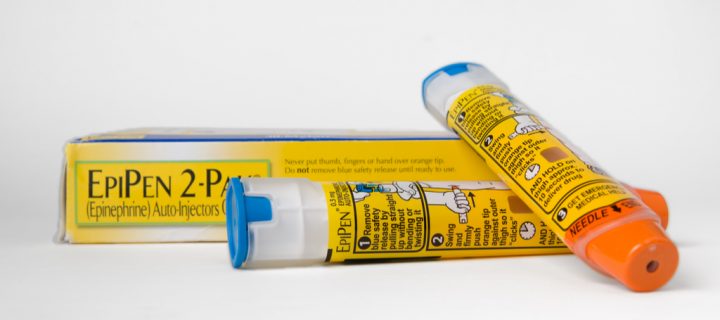The devices were recalled because they might not work properly.
An estimated 200,000 people are rushed to emergency rooms across the US due to an allergic reaction to food each year. This number represents the 40% of kids and over 50% of adults with food allergies who have experienced severe reactions that can lead to anaphylaxis.
Many people rely on an EpiPen for a sense of security and lifesaving technology. On March 21 2022, Adamis Pharmaceutical Corporation issued a nationwide voluntary recall of its EpiPens. A statement on the US Food and Drug Administration (FDA) website explains that some lots of their EpiPens have the potential to have clogged needles that prevent the device from dispensing epinephrine.
Which EpiPens were recalled?
Adamis announced they are recalling specific lots of SYMJEPI (epinephrine) Injection 0.15 mg (0.15 mg/0.3 mL) and 0.3 mg (0.3 mg/0.3 mL) Pre-Filled Single-Dose Syringes. To find out more about lots, expiration dates, and what the product looks like, click here.
According to the FDA’s website, the products were packaged with two pre-filled, single-dose syringes per carton. These EpiPens were distributed nationwide and contain the label US WorldMeds. If you have had an adverse reaction or problems with the quality of this product, you can report it to the FDA’s MedWatch Adverse Event Reporting program. You can do this by:
- Completing and submitting a report Online
- Downloading the form or calling 1- 800-332-1088 to request one
- Completing the form and returning it to the address on the form, or faxing it to 1-800-FDA-0178
What is an EpiPen?
An EpiPen is a hypodermic device that can be used in an emergency to administer a dose of epinephrine to help fight against the symptoms of anaphylactic shock. It works by delivering a quick dose of the drug form of adrenaline to reverse an allergic reaction. The use of an EpiPen doesn’t avoid a trip to the hospital but does bide the victim some extra time before medical help arrives.
If a person experiences anaphylactic shock and doesn’t receive the help of an EpiPen, or other medical assistance to fight back against their body’s reaction to the allergen, they can die.
Related: Is coffee good for your heart? This study says it is
This happens when a significant drop in blood pressure causes blood to drain from a person’s vital organs. A person can also die from swelling that shuts off their airways and prevents them from breathing.
According to Sciencehistory.org, EpiPens have their roots in the Cold War when the military wanted a quick device personnel could use to self-inject nerve gas antidotes. Today, millions of people worldwide rely on EpiPens for their safety.
Allergies in North America have risen in recent decades
Food allergies are on the rise worldwide and scientists don’t really know why. About 6.7% of Canadians, and between 2% and 10% of Americans self-report having food allergies. The most common include allergies to milk, peanuts, eggs, tree nuts, soy, wheat, and shellfish. Some experts have suggested that improved hygiene has led to fewer infections in children and that this is driving increases in food allergies. Parasitic infections, while troublesome, trigger the same mechanisms the body uses to tackle food allergies, and with fewer arising in childhood populations, experts are suggesting this may be leading to increases in allergies. Vitamin D deficiency has also been cited.
Talk to your doctor about an EpiPen prescription if you think you may need one.
photo credits: Amy Kerkemeyer/Shutterstock.com











